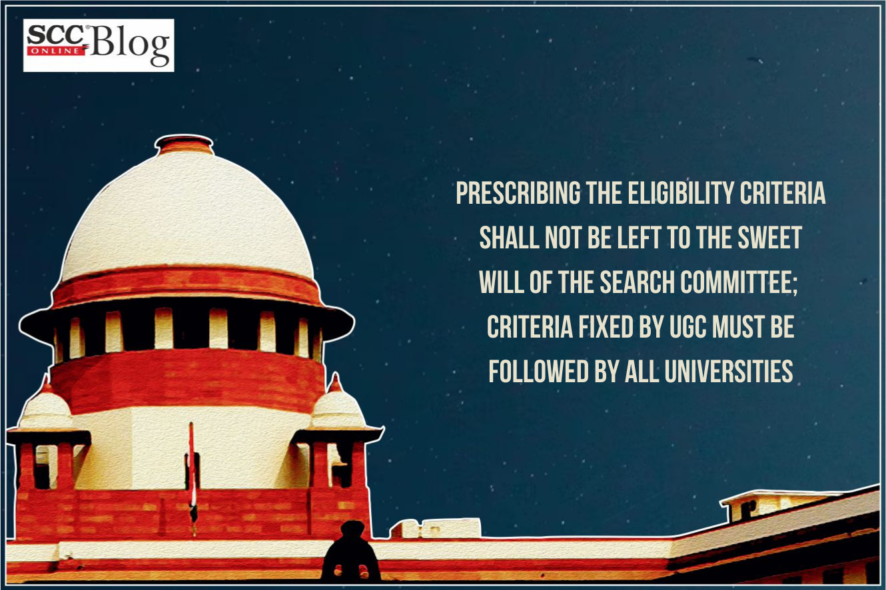Supreme Court: In a case relating to the appointment of the Vice-chancellor of the Sardar Patel University where the search committee had gone against the eligibility criteria prescribed by the UGC Regulations, the bench of MR Shah* and BV Nagarathna, JJ has held that the eligibility criteria when once fixed by the UGC under its regulations would apply to all the universities which are aided by the UGC to be bound by the said regulations even in the absence of the same being incorporated under the respective universities Act of the respective States.
Factual Background
Regulation 7.3.0 of UGC Regulations on Minimum Qualifications for Appointment of Teachers and Other Academic Staff in Universities and Colleges and Measures for the Maintenance of Standards in Higher Education, 2010 prescribes that a person shall have ten years of teaching work experience as a professor in the University system. It also provides for constitution of a Search Committee consisting of a nominee of the Visitor/Chancellor, a nominee of the Chairman of UGC, a nominee of Syndicate/Executive Council of the University. The Search Committee has to recommend the names of suitable candidates for appointment as Vice Chancellor of a University
The petitioner argued before the Court that ignoring Regulation 7.3.0 of the UGC Regulations, a Search Committee was constituted under Section 10(2)(b) of the Sardar Patel University Act, 1955 (SPU Act) with no nominee of the Chairman of the UGC. According to the petitioner, even as per Section 10(2)(b), the Search Committee has only the authority to recommend a panel of suitable candidates. The Search Committee, in the present case, exceeded its jurisdiction and prescribed its own eligibility criteria for the post of Vice Chancellor by diluting the eligibility criteria laid down in the UGC Regulations, 2010.
Analysis
The UGC Regulations are enacted by the UGC in exercise of powers under Section 26(1)(e) and 26(1)(g) of the UGC Act, 1956. Even as per the UGC Act every rule and regulation made under the said Act, shall be laid before each House of the Parliament. Therefore, being a subordinate legislation, UGC Regulations becomes part of the Act. In case of any conflict between State legislation and Central legislation, Central legislation shall prevail by applying the rule/principle of repugnancy as enunciated in Article 254 of the Constitution as the subject ‘education’ is in the Concurrent List (List III) of the Seventh Schedule of the Constitution.
Further, the eligibility criteria when once fixed by the UGC under its regulations would apply to all the universities which are aided by the UGC to be bound by the said regulations even in the absence of the same being incorporated under the respective universities Act of the respective States.
The Court noticed that the State of Gujarat did not take note of the communication from the UGC and instead the University left to the sweet will of the search committee to prescribe eligibility criteria for the appointment of the Vice-Chancellor of the University.
In such circumstances, the Court observed,
“… prescribing the eligibility criteria shall not be left to the sweet will of the search committee. It may lead to arbitrariness and different search committees in absence of any statutory guidelines and/or prescription, may prescribe different eligibility criteria.”
[Gambhirdhan K. Gadhvi v. State of Gujarat, 2022 SCC OnLine SC 256, decided on 03.03.2022]
*Judgment by: Justice MR Shah
Counsels
For petitioner: Senior Advocate IH Syed
For UGC: Advocate Manoj Ranjan Sinha
For University: Senior Advocate Vinay Navare
For Vice-Chancellor appointee: Advocate Gaurav Agrawal
For State: Advocate Ruchi Kohli







